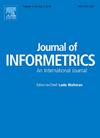Measuring knowledge complexity in the biomedical domain based on a question-method knowledge representation model
IF 3.5
2区 管理学
Q2 COMPUTER SCIENCE, INTERDISCIPLINARY APPLICATIONS
引用次数: 0
Abstract
In nowadays knowledge-driven economy, knowledge complexity plays a crucial role in gaining a competitive advantage. In the biomedical field, this complexity spurs innovation and enables resource monopolization. Previous studies on knowledge complexity have primarily examined the interactions between knowledge units and nonknowledge systems from a macro perspective. These analyses often overlook how the micro-level components of knowledge influence its overall complexity. This study marks a departure from such approaches by conceptualizing biomedical knowledge in terms of questions and methods, as well as proposing a novel method to measure knowledge complexity. This approach emphasizes the exploration of connections between knowledge units by constructing a question-method bipartite network. The validity of our methodology was rigorously tested through controlled experiments involving random networks and a comprehensive review of the relevant literature. Furthermore, this study reveals the relationship between knowledge complexity and dissemination, suggesting that the more complex knowledge is, the more likely it will be cited frequently. Internal knowledge flows within the same research question exhibit greater sensitivity to knowledge complexity than external flows. This study can help demystify the sophisticated scientific knowledge system and provides detailed insights into the complexity of scientific knowledge and dissemination mechanisms.
基于问题-方法知识表示模型的生物医学领域知识复杂性度量
在当今知识经济时代,知识复杂性对企业获得竞争优势起着至关重要的作用。在生物医学领域,这种复杂性刺激了创新,使资源垄断成为可能。以往关于知识复杂性的研究主要是从宏观角度考察知识单元与非知识系统之间的相互作用。这些分析往往忽略了知识的微观组成部分如何影响其整体复杂性。本研究从问题和方法的角度对生物医学知识进行了概念化,并提出了一种测量知识复杂性的新方法。该方法强调通过构建问题-方法二部网络来探索知识单元之间的联系。我们的方法的有效性通过涉及随机网络的控制实验和相关文献的全面审查进行了严格的测试。此外,本研究揭示了知识复杂性与传播之间的关系,表明知识越复杂,越容易被频繁引用。同一研究问题的内部知识流对知识复杂性的敏感性高于外部知识流。这项研究有助于揭开复杂的科学知识体系的神秘面纱,并为科学知识的复杂性和传播机制提供详细的见解。
本文章由计算机程序翻译,如有差异,请以英文原文为准。
求助全文
约1分钟内获得全文
求助全文
来源期刊

Journal of Informetrics
Social Sciences-Library and Information Sciences
CiteScore
6.40
自引率
16.20%
发文量
95
期刊介绍:
Journal of Informetrics (JOI) publishes rigorous high-quality research on quantitative aspects of information science. The main focus of the journal is on topics in bibliometrics, scientometrics, webometrics, patentometrics, altmetrics and research evaluation. Contributions studying informetric problems using methods from other quantitative fields, such as mathematics, statistics, computer science, economics and econometrics, and network science, are especially encouraged. JOI publishes both theoretical and empirical work. In general, case studies, for instance a bibliometric analysis focusing on a specific research field or a specific country, are not considered suitable for publication in JOI, unless they contain innovative methodological elements.
 求助内容:
求助内容: 应助结果提醒方式:
应助结果提醒方式:


